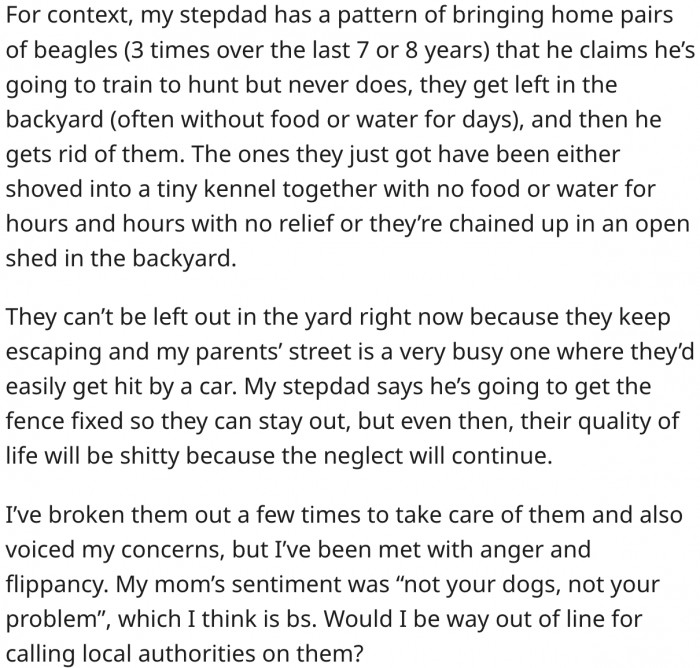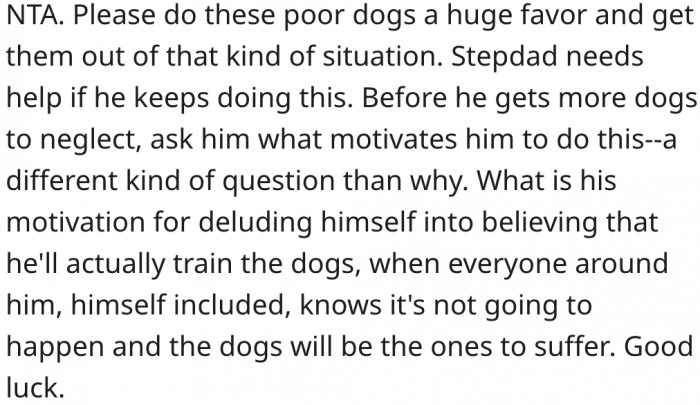Daughter Wants To Call Animal Services On Her Parents For Neglecting Dogs They Bring Home
A Reddit user by the name of rom_dot_com shared a post on the platform's "AITA" subreddit about her stepfather's pattern of mistreatment towards beagles. She explains that her stepdad has a history of bringing home pairs of beagles, claiming that he will train them to hunt, but never actually does.
Instead, he leaves them in the backyard, often without food or water for days, and eventually gets rid of them.
The beagles that he currently has are being kept in poor conditions, either being shoved into a tiny kennel with no food or water for hours on end or being chained up in an open shed in the backyard.
Rom_dot_com expresses her concerns about the beagles' well-being and states that they cannot be left in the yard because they keep escaping, and her parents' street is a busy one where they could easily get hit by a car.
Her stepdad says he's going to fix the fence, but she believes that even then, their quality of life will be poor due to the neglect. She has attempted to care for the beagles and voice her concerns to her family but has been met with anger and indifference, with her mother saying, "Not your dogs, not your problem."
Rom_dot_com is unsure if calling the local authorities on her stepfather would be out of line and is seeking advice from the Reddit community on the matter. Here are the responses she received from the community.
Here's OP's story and Reddit responses.

1. She could give the authorities an anonymous tip.

2. She should redirect suspicion to her neighbor passersby.

The neglect of animals often reflects deeper psychological issues within the individual. A study from the University of Pennsylvania found that individuals who engage in animal cruelty may display signs of antisocial behavior or unresolved childhood trauma.
This suggests that addressing the underlying psychological factors could be key to mitigating these harmful behaviors. Understanding the connection between emotional dysregulation and animal neglect is essential for developing effective interventions.
Encouraging Family Dialogue
Effective communication within families is crucial for addressing issues of neglect. Research from the University of Michigan indicates that open family discussions can lead to better understanding and resolution of conflicts.
Encouraging families to express feelings and concerns about animal care can foster a collaborative approach, allowing for shared responsibility. Workshops or family therapy can provide valuable tools for improving communication and empathy among family members.
The Emotional Impact of Animal Neglect
Animal neglect can evoke strong emotional responses, both from the animals themselves and from those who witness it. Research indicates that individuals exposed to animal cruelty often experience heightened empathy and a desire to intervene.
Dr. David F. Smith, a psychologist studying human-animal relationships, notes that witnessing neglect can trigger protective instincts similar to those experienced in childhood.
3. She would be doing the dogs a favor by reporting.

4. She'd be a hero to the dogs.

5. There should be a special place in hell for animal abusers.

The Role of Empathy
Empathy is a crucial factor in the humane treatment of animals. Research published in the journal "Personality and Social Psychology Bulletin" highlights that empathy can be influenced by upbringing and social environments.
When individuals lack compassionate role models, they may struggle to understand the emotional states of others, including animals. Encouraging empathy through education and community programs can help foster a more compassionate attitude towards animals in our society.
Additionally, the dilemma of involving authorities like animal services can create moral conflict for the daughter. Studies show that when individuals face ethical dilemmas, they often experience significant emotional distress.
This can lead to feelings of guilt or helplessness, especially when considering the potential consequences for family dynamics.
6. No animal deserves to be maltreated.

7. She should go further to have him blacklisted from wherever he's getting the dogs.

8. She should keep her safety in mind.

Dr. Karen Allen, a licensed psychologist, emphasizes the importance of early intervention in cases of animal neglect. Her research indicates that individuals who neglect animals often lack proper coping mechanisms and emotional support.
Providing educational resources and counseling for families can be instrumental in preventing these issues. Programs that teach responsible pet ownership and emotional intelligence can create a more supportive environment for both humans and animals.
Approaches for Handling Ethical Dilemmas
One practical solution is to engage in open conversations about the situation with family members. Research supports the idea that discussing moral dilemmas can lead to more informed decision-making and reduce feelings of isolation.
Creating a family dialogue can promote understanding and empathy toward the animals involved.
9. Her mom is equally guilty for allowing the abuse to continue.

10. Her stepfather deserves whatever comes to him when she reports him.

11. The a-hole is her stepfather.

Behavioral Interventions
Behavioral psychology offers valuable insights into changing neglectful patterns. According to research published in "Behavioral Psychology", consistent reinforcement of positive behaviors can lead to significant changes.
In this context, rewarding responsible behavior towards pets can encourage a shift in mindset. Family members can implement small rewards or positive feedback when they see care being given to the animals, reinforcing the desired behavior.
Involving a neutral third party, like a counselor or mediator, can also help navigate these complex emotions and facilitate discussions about responsibility and ethics.
Studies in conflict resolution emphasize the value of professional support in addressing family dilemmas.
12. Reporting will save the dogs.

13. Her stepfather and mom shouldn't be allowed to raise animals.

14. She would be an a-hole if she didn't report.

The concept of cognitive dissonance explains why some individuals engage in neglectful behavior despite knowing it's wrong. Studies show that when people act against their beliefs, they experience discomfort, leading to rationalization.
Helping individuals confront this dissonance through open discussions about their actions and values may prompt healthier behaviors. Creating a safe space for dialogue can facilitate this process and promote accountability.
What Do You Think?
Dealing with animal cruelty involving a family member can be difficult and sensitive, requiring a thoughtful and well-planned approach. One important step is to gather evidence of the abuse or neglect, such as photos, videos, or eyewitness accounts.
This evidence can be used to support any legal or administrative actions that may be taken. It's also important to have a calm and respectful conversation with the family member about the abuse or neglect and explain your concerns.
If the situation is severe, it may be necessary to contact local animal control or law enforcement authorities. Seek help from local animal welfare organizations or advocacy groups for support and advice.
Additionally, if the family member is struggling with underlying issues that may have contributed to the animal cruelty, it may be beneficial for them to seek therapy or counseling. Remember, the safety of the animals should always be the top priority, and it may take time and patience to resolve the issue.
Psychological Analysis
This situation highlights the internal conflict that often arises when family values clash with the welfare of animals.
Recognizing these complexities can facilitate more compassionate approaches to addressing animal neglect.
Analysis generated by AI
Analysis & Alternative Approaches
Addressing animal neglect requires a sensitive approach that considers the emotional and ethical complexities involved.
Research indicates that open dialogue and professional support can help families navigate these challenges effectively.
Moving Forward: Actionable Steps
Addressing animal neglect requires a multifaceted approach that includes psychological insights and family dynamics. Research supports the idea that empathy, communication, and behavioral reinforcement are vital for change.
As noted in studies on emotional regulation, fostering a supportive environment is crucial. By equipping families with the tools to communicate effectively and understanding the psychological factors at play, we can promote humane treatment of animals and prevent neglectful behaviors.



